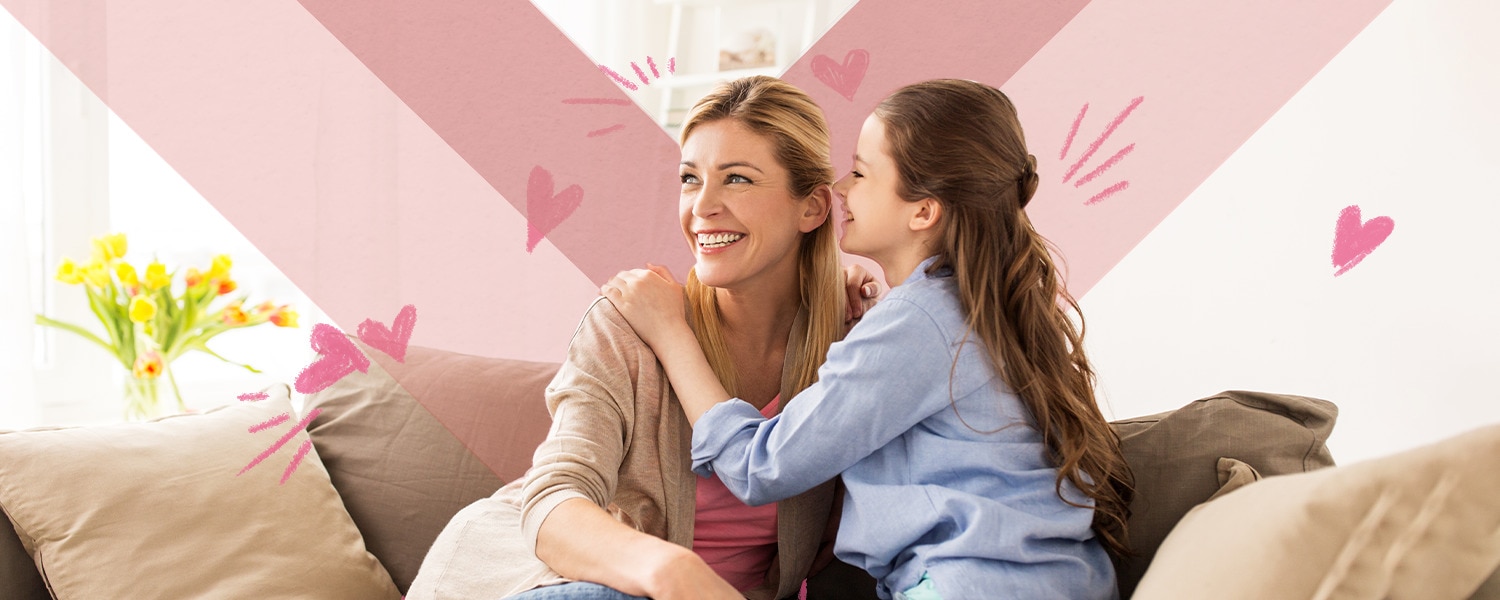

Talking to your daughter about periods – is it time for a rethink?
If your daughter is approaching puberty, she is likely to be feeling anxious about starting her periods.
Finding ways to talk about it in an open and confident manner will make all the difference to her experience of menstruation. But how can you introduce the subject and get over the awkwardness that surrounds a young girl’s first period?
Your daughter’s first period doesn’t need to be a source of worry, but – more often than not – it is. If their first inkling of menstruation is playground gossip and jokes, a young girl can develop a sense of fear, anxiety and isolation at the prospect of what’s ahead. Myth, shame and embarrassment often mean periods go undiscussed in the family home, which can result in your child stressing over what is a totally natural thing. It’s clear that we need to think carefully about how to talk to our daughters about periods.
Menstruation is a natural process, but we still live in a society where we hide pads up our sleeves, where images of blood stains are removed from social media and sportswomen are reluctant to speak up on the impact of menstruation on their performance.
Nana research has found that almost half of UK women and girls find it difficult to talk about their periods with friends and family – mothers and sisters included. There’s a sense of taboo about periods, like they’re something to be ashamed of. And this is perpetuated into adulthood, which means that although a quarter of women of reproductive age are menstruating at any one time, and the average woman spends about an eighth of her life menstruating, it is still considered an unwelcome topic.
“Menstruation is a natural process, but we still live in a society where we hide pads up our sleeves, where images of blood stains are removed from social media [1] and sportswomen are reluctant to speak up on the impact of menstruation on their performance,” said marketing director at Essity Hygiene Products, Nicola Coronado.
Having the conversation
We need to start talking to our daughters in a general way about periods around the age of seven. Although the average age for starting periods is 12, they can start as early as eight, and occasionally girls are hitting puberty even younger. A study in 2010, published in the US Journal of Pediatrics, revealed that girls were reaching puberty ever more prematurely, with some developing breasts as young as six. Girls in homes without a biological father are more likely to hit puberty at an earlier age, according to a study led by researchers at the University of California, Berkeley’s School of Public Health. While some research shows that the presence of a stepfather in the family can also trigger early periods.
There’s no doubt that the conversations and rumours will start at school well before your daughter needs her first sanitary towel. So talking about periods in a natural way from an early age is important if she’s to feel prepared.
We asked a few young women how they felt about the issue, and here’s what they said: “Talk to us about periods just the same way you’d explain about skincare – so we understand what’s going on physically, and what we need to do,” says Toni, who learnt about periods from her female cousin. “I want the facts but don’t want to actually have the conversation,” says Karli, an only child. “It would make me cringe, so I guess a letter or a text would be the best way to tell me all about periods.” “Mum didn’t talk to me about periods until I’d had my first one and made a mess of my clothes. That was just dumb. If it hadn’t been for my friends I’d have been in such a mess. So yes, it’s embarrassing, but we still need to know this stuff. Just like we need to know how to do maths,” adds Sam.

Introducing the subject
Having the period talk can be intimidating for parents, of course, who may feel awkward and embarrassed. This is something that can be overcome, especially if it’s done gradually. Have a series of conversations, not one big talk, so it doesn’t feel like a huge, scary moment.
Introduce the subject briefly to start with, so she knows periods are up for discussion. Look for teachable moments that give you an opportunity to talk about them. Advertisements for sanitary protection, TV soap storylines that cover the issue, sports stars and celebrities discussing issues around menstruation, social media campaigns – all give you a ‘way in’ to start a discussion.
First ask your daughter how much she knows about periods, so you don’t get the eye-rolling response when you start telling her something she’s already well aware of. Try talking about your own period experiences, as a teen and as a woman, so she can relate to the subject in a more personal way. Keep the story positive or at least with a positive outcome, so she doesn’t panic about something similar happening to her. Or talk about something that happened to a friend at school or a female celebrity who has mentioned periods in an interview.
When she’s ready to ask them be prepared to answer any questions in an honest way, like ‘How much blood will I lose?’ and ‘What if blood leaks through my clothes?’ and ‘Will anyone be able to tell I’m on my period?’ [1] And always use clear language like ‘period’, ‘vagina’ and ‘sanitary towels’ (not euphemisms like ‘time of the month’, ‘down there’ and ‘protection’) to avoid confusion.
We teach them that it is a hygienic crisis, rather than what it is, which is an important gateway to talk about our bodies, our sexuality, our health, how we mature and age, as well as body image issues.
Being open with her about the process of periods and how to manage them will help your daughter develop more confidence about them. Talking about them, getting used to sanitary towels and knowing about the various stages and symptoms means the whole subject gets de-mystified.
Most importantly, avoid being negative about periods so she doesn’t view them with dread or revulsion. No more talking about ‘the curse’ or even ‘my monthly visitor,’ which just sounds ominous. Keep the language positive, so it’s just a natural part of becoming a woman that all women share.
“We teach them that it is a hygienic crisis,” says Chris Bobel, author of New Blood: Third-Wave Feminism and the Politics of Menstruation, “rather than what it is, which is an important gateway to talk about our bodies, our sexuality, our health, how we mature and age, as well as body image issues.”
Dispel the myths
In the process of discussing periods, it’s important to dispel the myths that swirl around them, which can make your daughter feel like menstruation is something shameful. She may know it’s nonsense but it doesn’t help to hear made-up tales like menstrual blood is ‘unclean’.
Other approaches
Single fathers shouldn’t feel that they can’t talk to their daughters about periods, but if you do find she’s uncomfortable, try enlisting the help of a sympathetic aunt, female cousin or other family member, so she’s fully prepared. And make sure you offer comfort when she’s premenstrual. Buy your daughter’s choice of sanitary products and ensure she knows where they are when she needs them.
Sometimes the period chat won’t go too well, as your daughter may in the moment feel too shy and embarrassed to talk about something so personal. But she will still have questions and feelings to discuss, so later on let her know – by text or by letter – that you’re always available if she needs to know more.
A letter allows you to say all you want to without fear of her shutting you down. And don’t forget that teenagers often feel more comfortable addressing their feelings by text or WhatsApp, so don’t shy away from having this conversation entirely by messaging if it works for her.
A great way to communicate about periods is through Femojis – emojis that specifically deal with female issues. Most 16 to 25 year olds admit they find it easier to express themselves through emojis, so this is a quick and easy way to address issues and feelings you may both find embarrassing.
Nana has recently campaigned for six period Femojis – icons that enable users to say things like ‘period’, ‘cramps’ and ‘PMS’ in shorthand – to be added to the universal emoji keyboard. All in an effort to make talking about periods more natural and less taboo, which can only be a good thing for girls as they enter puberty.
The app with Nana’s Femojis, available for both iOS and Android keyboards, is really easy to install. Because talking about periods needn’t be difficult at all.
